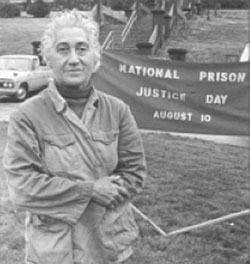

Claire Culhane – an internationally recognized leader in the anti-war and prisoners’ rights movements – was one of the foremost political activists of her day.
Culhane was born in Montreal. Her parents, Rose and Abraham Eglin, were Russian Jewish immigrants. She had one older brother, Jack. From an early age, Culhane showed a passion for social justice and civil disobedience. In her youth, during the Depression, Culhane was part of the relief movement in Quebec. Later, as a young woman, she joined the Communist Party of Canada and supported an end to the Spanish Civil War. The RCMP file on her activism ultimately spanned almost 50 years.
In 1967, Culhane accepted a one-year government contract to work at a tuberculosis hospital in Quang Ngai City, Vietnam (near Saigon). She intended to use her training as a medical records librarian in Montreal to serve the hospital as an advisor and administrative assistant. She soon realized that the confidential record system she had helped to set up was being repeatedly compromised by the head of the Canadian medical aid team, who was passing along patient information to both the American Embassy and the CIA. She became disillusioned with Canada’s role in the war and left Vietnam in February of 1968, less than two weeks before the My Lai massacre.
Back in Canada, Culhane protested the war in numerous ways. She filed an official protest with the Canadian government, did a 10-day fast on Parliament Hill in Ottawa, chained herself to a gallery chair in the House of Commons, and camped out for 19 days in the cold with filmmaker Mike Rubbo to distribute anti-war pamphlets during their “enough/assez” campaign. She also wrote a book, Why is Canada in Vietnam? The Truth about our Foreign Aid, which helped galvanize the anti-war movement.
Beyond this, Culhane was best known for her work in support of prisoners’ rights; she did not believe in reforming prisons, but in dismantling them. In 1975, there was a hostage crisis at the Lakeside Regional Correction Centre for women, where Culhane volunteered as a women’s studies teacher. Three prisoners who were being sent back to solitary confinement took 15 people hostage, leading to a 41 hour standoff with prison officials; a young guard was accidentally killed by the guards when the emergency response team stormed the premises.
Culhane became a founding member of the Vancouver activist group Prisoners’ Rights Group and, in 1976, joined the newly formed Citizens Advisory Committee (CAC). With CAC, she helped to negotiate the end of the worst riot in 50 years, at BC Pen, but was subsequently barred from entering prisons for many years. She wrote two books about these experiences, Barred from Prison: A Personal Account and Still Barred from Prison: Social Injustice in Canada. Her activism included sit-ins at warden’s offices, picketing on Parliament Hill, hosting a cable TV show called Instead of Prisons, and writing and speaking extensively on the topic of prison as a form of social control.
A biography of Culhane, One Woman Army by Mick Lowe, was published in 1992.

